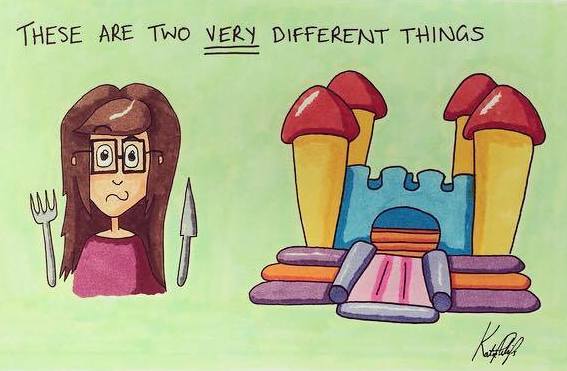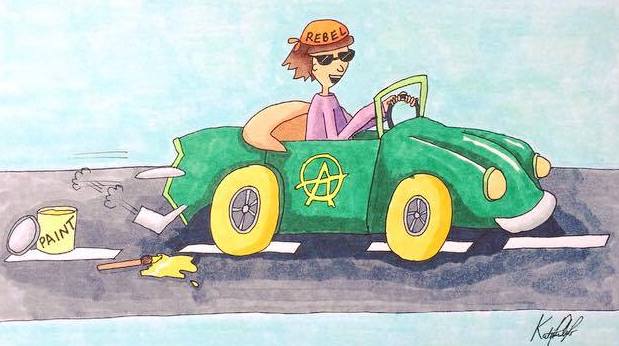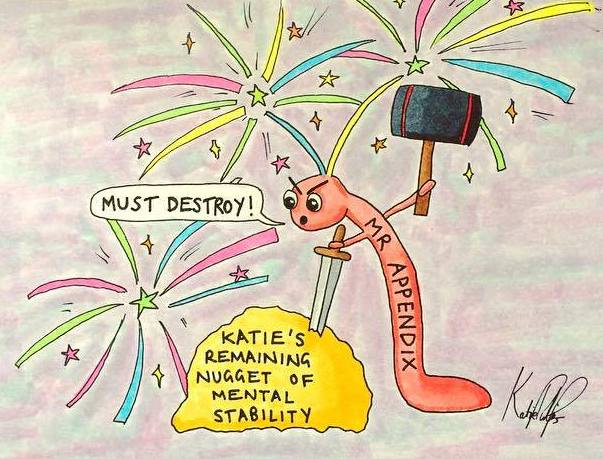If I had a penguin for every time I have heard someone say or have said myself “I want to recover from anorexia but I don’t want to gain weight”, I would have more penguins than exist on this planet and would therefore have to get the existing penguins to rapidly reproduce in order to make up numbers (which is why all the penguins of the world are probably grateful to hear that I don’t have to have a penguin for every time I have heard that sentence or else they would have a lot of egg hatching to do).
Admittedly, there are many sides to the Rubix cube confusing madness that is recovery from anorexia, both mental and physical, and there are a lot of fears revolving around all of them, but I think when it comes to recovery, probably one of the top three things most people worry about is the weight gain side of it all. Personally at least, I know that the fear of weight gain is certainly a big thing for me and is particularly relevant right now as in my current admission to hospital it is the forced and rapid weight gain that has ended up distressing me most of all to the point that I haven’t even been able to focus on any of the more long term mental health sides of the illness as I am too focused on the scales.
I know that to other people, my weight does not define me as a person and that the number that flashes up when I step on a little machine should not dictate the way I live my life but when you have an eating disorder, those thoughts are often automatic and knowing they are irrational doesn’t take them away.
Unfortunately, despite the fact that the weight gain side is incredibly hard, if you really want to recover from your eating disorder, the fear of weight gain is an unavoidable thing that will need to be tackled and that, if neglected, will never truly allow you to get back to a healthy mind and body again.
So how do you manage it? If you want to recover from your eating disorder (or even if you don’t and are in forced treatment at the moment…ahem), how are you supposed to deal with one of the most frightening challenges to face someone struggling with anorexia: weight gain. Well, if that question has been on your mind at all then welcome to a blog post containing some possible answers, because today I am here (wearing a bow tie no less because I am fancy and have dressed smartly for you on this occasion), with 5 thoughts to help you deal with weight gain when you are in recovery from anorexia. So without further ado, lets get into it *straightens bow tie and gets down to serious business*…
1. Weight redistributes – When you start the re-feeding process after depriving yourself of adequate nutrition for a long period of time, your body will have no idea what the hell is going on or what the hell to do (something I explain a little more in this post here: Five Things You Need To know About Re-feeding During Eating Disorder Recovery). Because of this confusion and deprivation, when your body first starts gaining weight, it will want to prioritise on life saving things first (handy that) and for this reason a lot of people find that weight gain in the early days primarily goes to the tummy area so that the body can focus on repairing things like a dodgy liver or an out of whack kidney. This has happened to me multiple times (including right now) and understandably it can be quite distressing as your body can start feeling out of proportion, but what I want to emphasise with this point is that even though weight may initially go to life saving organ places, it WILL redistribute and spread out eventually as long as you hang in there and give it time. Restricting your intake to lose the weight again will only make this process more dramatic, so the key is to stick with it and always remember that redistribution will happen!
2. You are gaining weight you shouldn’t have lost in the first place – Whenever you see or hear an advert for a weight loss diet club, the people will emphasise how good it is to have lost the weight they did with whatever weird low carb eat upside down with a pineapple up your nose (difficult task, would not recommend) diet they have been following and therefore the idea of gaining any weight back is automatically “bad”. Culturally this has then created this false idea that the act of gaining weight is a bad thing in itself however this is not always the case, especially when it comes to recovery. Thing is, when you are regaining weight you have lost through an eating disorder, you are actually not gaining weight but are regaining parts of your body that you should not have lost in the first place, so whenever you see that number go up on the scale remember, it is not weight gain in the negative way that the diet clubs claim it to be, it is just re-finding a little puzzle piece of the wonderful you that may have been lost to this terrible illness.
3. The alternative is worse – I will hold my hands up and admit it: weight gain is scary. Then again, if you think about it, isn’t the alternative, aka death (for anorexia is the mental illness with the highest mortality rate of all), even scarier? “I am not that bad” I hear you cry, “I am not going to die of anorexia”, but hey, that’s what they all say and in a lot of cases, it turns out not to be true. Anyway, even if you are one of the fortunate souls whose body somehow manages to survive the abusive nature of an eating disorder and live, what kind of a “life” is it to spend your days tortured and tormented by a beast in your head? Weighing things up then (no pun intended…actually screw it…with me the pun is ALWAYS intended), although weight gain is scary, when you are going through the process it is important to think of the alternative, and remember that that alternative is a hell of a lot worse.
4. Weight gain is not as visible as you think – If you are like me, when you stand on the scales and see that the number has gone up, you can immediately see where that extra weight has gone to. This however, in the nicest possible way, is utter nonsense because in actual fact changes in body weight are no where near as visible as we might think. I remember one week when I gained one pound and instantly I saw my physical appearance change into something unrecognisable to the person I had been before that pound. Know what everyone else saw? Nothing. I would be lying to say that no weight gain is ever visible (as someone who has just spent 5 months in hospital I can guarantee I do look very different now), but my point here is that weight that you gain every week at weigh ins is not as visible as you might think and if you think you can see that pound or two of extra weight then it is simply proof that your eating disorder is distorting your vision. Don’t listen to its lies I say!
5. Getting bigger doesn’t mean you are big – If I ran a banana farm and after the harvest found that I had 1000 bananas, that would be a lot of bananas (and I would clearly be one hell of a good banana farmer). In that circumstance then, 1000 banana would be the definition of a lot of bananas. If the next year I then had 100 bananas would I think that I had hardly any bananas (trust me I do have a point here and am not just trying to send subliminal messages to you all about my secret dream to become a banana farmer). If however I had 0 bananas one year and then the next had 100, 100 bananas would be my definition of “loads of bananas” and that is what it is like with weight: aka all relative. Just because you are gaining weight and getting “bigger” it does not mean that you are big. You might think “I am huge” because the number on the scales has gone up but what I am saying is that just because the number has got higher it doesn’t mean that number is big. 100 bananas only looks like a lot of bananas if you previously had no bananas, just as a certain number of kilos only seems “huge” because it is bigger than the nothing you had previously and every “high” number you fear only seems high because you are looking at a lower one first. Getting bigger does not mean getting big therefore and if it was the other way round (aka the 1000 banana situation first) then your “high” number would be someone else’s low in a different situation. Whenever you see you have gained weight and feel like your weight is high, remember the bananas and the fact that a high number only seems big because it is bigger than the previous number and it is not that the number is big in itself.
SO there you have it! 5 thoughts to help you manage the fear and stress that is the weight gain side to recovery from an eating disorder! As always I am not saying that this blog post is going to solve the problem, nor will it probably make gaining weight any easier, but these thoughts are at least important and sometimes helpful/comforting things to bear in mind when the voices are getting a bit too loud for comfort and you have no arguments to fight against them. These thoughts are therefore your arguments against all of those bad thoughts, your weapons for the recovery battle, so take them brave soldier and use them wisely to outwit that cunning eating disorder who is trying to fool you into making weight gain seem like a bad thing.
In the meantime, if you are someone struggling with the anxiety ridden process that is gaining weight, please know that I really do feel for you as someone who has gone through the process multiple times myself (and is still going through it today), and I hope that this blog post has perhaps helped a little bit. Remember, recovery and weight gain is hard but losing your life to a cruel demon in your mind is far worse.
Take care everyone x






